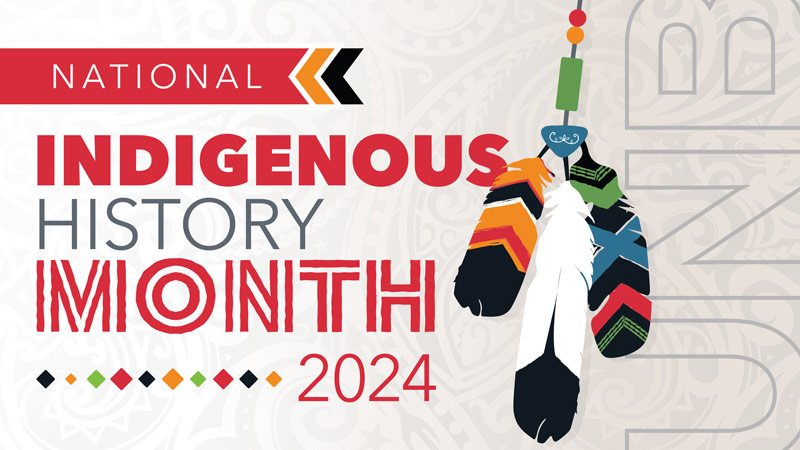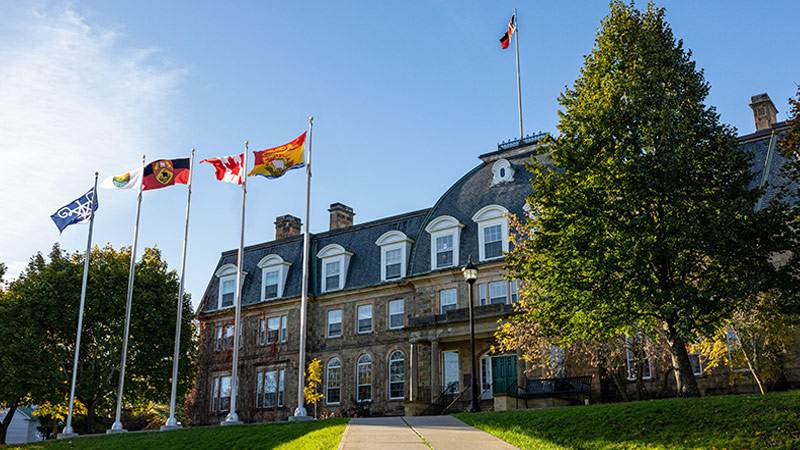Indigenous History Month 2024: A year-in-review toward reconciliation
Author: Kayla Cormier
Posted on Jun 6, 2024
Category: UNB Saint John , UNB Fredericton

The University of New Brunswick (UNB) community is commemorating National Indigenous History Month in June and honouring the remarkable contributions of the Wabanaki people.
Throughout this month, we will share new stories highlighting Indigenous Peoples, their voices, knowledge, cultures and ways of being. To begin, we want to reflect on the stories and initiatives undertaken over the past year on our campuses and beyond. These stories are part of an ever-growing friendship between UNB and wider Indigenous communities. They are vital steps on our continuous path toward truth and reconciliation.
On Sept. 30, 2023, UNB hosted commemorative ceremonies on both campuses to honour the Survivors of residential schools and to remember the children who did not return home.
Elders, residential school Survivors and the community came together to write their reflections on an orange heart which were then displayed together in a commemorative space.
In Fredericton, members gathered in front of Sir Howard Douglas Hall to commence the day with a flag-raising ceremony. Raising the Wabanaki Confederacy and Wolastoqey Nation flags marked a significant step in acknowledging that UNB sits on traditional Wolastoqey territory.
These flags are emblems of UNB’s ongoing path toward truth and reconciliation and serve as symbols to foster positive internal and external relations between the broader university community and Indigenous communities.

In October 2023, Indigenous leader, advocate and trailblazer Cheyenne Joseph was installed as UNB’s Piluwitahasuwin, associate vice president of Indigenous engagement.
We told Lily George's story, a record-breaking UNB REDS star athlete and Indigenous leader.
In March 2024, we held a ceremony to recognize assistant biology professor Dr. Charles Sacobie UNB’s Indigenous science scholar (BSc'98, MSc'01, PhD'11) or Skitqomiqewi Kcicihtuwinut (Skit-goh-mee-gewi Kchee-geet-wee-nood), meaning "Earth Knowledge Keeper" in the Wolastoqey language.
In April, friends, family, classmates, faculty and alumni gathered to celebrate the many achievements of Mi’gmaq entrepreneur and national and community leader, Victoria LaBillois (BA’91, MBA’04). She received the UNB Faculty of Management Certificate Achievement Award and was inducted permanently on the faculty’s Alumni Wall of Fame.
Chief Patricia Bernard (BEd’96, LLB’99) was awarded an Alumni Award of Distinction for securing a historic settlement for the Madawaska Maliseet First Nation. This $145 million settlement is the largest land claim settlement in Maritime history. Chief Patricia Bernard submitted the original claim while in her second year at UNB Law and spent the next 23 years fighting for justice for the community.
We also shared success stories from the Wabanaki bachelor of education program. This is a four-year degree program in elementary education specializing in Wabanaki languages, cultures and worldviews.
“I’ve never seen a program that was so infused with our perspectives,” said Shelley Solomon, a graduate of the WBEd program.
These are just some of the incredible contributions made by Indigenous Peoples in the UNB community in the past year.
Transforming intentional thinking into meaningful action is a crucial element in the UNB Toward 2030 strategic vision. Piluwitahasuwawsuwakon – a Wolastoqey word gifted to UNB by Elder Opolahsomuwehs (Imelda Perley) – which means allowing your thinking to change so that action will follow in a good way toward truth, is the commitment identified within the strategic plan.
As an institution dedicated to producing and disseminating knowledge, we recognize and respect the history, culture, knowledge, languages, spirituality, beliefs and rights of Indigenous Peoples.
We promise to continue sharing stories of the remarkable contributions of Indigenous Peoples, honouring their legacy and fostering a deeper understanding and appreciation within our community.
